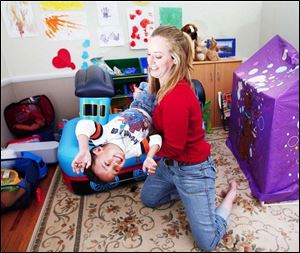
Toledo mom to lobby Congress about son's health condition
5/17/2007
Kami London will tell Congress about an increasingly common disorder that her son, Kyan Mwatha, has.
Kami London lets her 3-year-old son have only water and salt when they eat out.
The strict regimen isn't punishment or abuse: Kyan Mwatha can't have anything else.
Not only is Kyan allergic to milk, nuts, eggs, and other common foods, but the lively Toledo boy has an increasingly common disorder believed to be linked to severe allergies. His body's immune system treats food like a foreign object, dispatching a flood of white blood cells to attack tissue in his esophagus, causing inflammation and damage.
The mother and son are in Washington today to help lobby Congress for federal funding to research eosinophilic disorders as well as for improved insurance coverage for prescription formula Kyan and others need for nourishment.
No one knows why more children are being diagnosed with the disorders. Ms. London said she hopes more research will provide answers - and a better treatment than denying food or trying steroids.
"You think the world is so advanced medically, and then you find out the answer to so many questions about this disorder is, 'I don't know,'•" she said.
About a dozen families with members affected by eosinophilic disorders, such as the one Kyan has called eosinophilic esophagitis, are expected to help with lobbying and awareness today, said Beth Mays, president and founder of the American Partnership for Eosinophilic Disorders.
Eosinophilic disorders have been on the rise in the last 20 years and an estimated 50,000 people are affected, according to the partnership.
Many health-care providers and others are unfamiliar with the type of eosinophilic disorder Kyan has, although it afflicts 1 in 2,500 people, Ms. Mays said.
By comparison, she said, the more commonly known Crohn's disease, another disorder that causes inflammation in the digestive tract, affects 1 in 10,000.
Ms. London, a developmental psychology professor at the University of Toledo, said Kyan would vomit and spit up more than 100 times a day as a newborn and weighed just 15 pounds on his first birthday.
Initially doctors thought Kyan, who now weighs 31 pounds, had acid reflux and failure to thrive.
At 14 months, Kyan finally was diagnosed with the disorder at Baltimore's Johns Hopkins University, where Ms. London was working, she said.
Still, it typically takes three years for doctors to come to that conclusion because so little is known about it, she added.
Kyan immediately started on the prescription formula, which luckily has been covered by Ms. London's insurance. He soon began testing limited foods.
The formula typically costs $1,000 a month and some insurance companies don't cover it unless sufferers are fed through a tube, causing more difficulties for families, she said.
To determine whether Kyan is allergic to a food, doctors must perform deep-tissue biopsies in different areas of his digestive tract. So far, none has passed muster, Ms. London said.
Next month, Kyan will undergo his fifth biopsy to see if he's allergic to pork. If he is, Ms. London said she may allow one more testing cycle before putting him on a steroid, despite side effects, to see if that helps.
"The only way to really find out is trial and error," she said.
Before Kyan was diagnosed, Ms. London never realized how much society revolves around food. Celebrations typically involve food, for example, and books, TV, and other media often mention it, she said.
Meanwhile, Ms. London tries to avoid eating around her son because she feels guilty, and she wonders what other diners think if they do go to restaurants.
"He does ask for food, and I have to tell him, 'No.' I'm waiting for someone to call social services or something on me."
Contact Julie M. McKinnon at:
jmckinnon@theblade.com
or 419-724-6087.